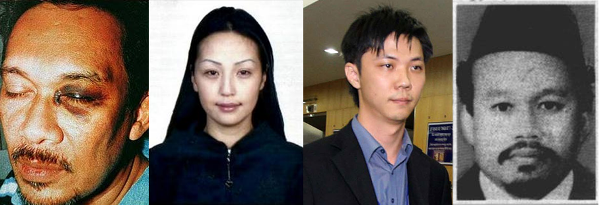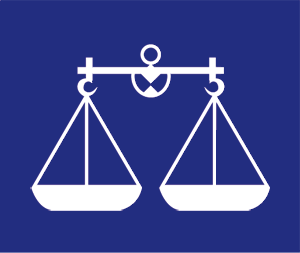For the second time in his career, Anwar Ibrahim faces apparently fabricated charges of sodomy
For the past two years, there have been hopes and expectations that Malaysia was about to become a proper democracy after more than half a century of one-party rule since independence from Britain in 1957.
But the chances of that are receding as the ruling Barisan Nasional coalition uses the full force of its institutional control against the prime proponent of reform, opposition leader Anwar Ibrahim.
For the second time in his political career, Anwar faces apparently fabricated charges of sodomy -- a crime bringing a maximum 20-year prison sentence in Malaysia -- and it is widely expected Malaysia's compliant courts will do the bidding of their political masters.
At the same time, there is a clear fraying of the carefully crafted ethnic and religious balance between the majority Muslim Malays and large minority ethnic Chinese and South Asian populations that has underpinned the Malaysian political and social compact.
The prospects of genuine reform appeared bright two years ago when Anwar's three-party coalition -- the Pakatan Rakyat, or People's Alliance -- made dramatic advances in the 2008 elections.
The opposition not only robbed the Barisan Nasional of the two-thirds majority it had enjoyed for over 50 years; it also won power in five of Malaysia's 13 states.
This was in itself a remarkable comeback for Anwar, who had been deputy prime minister, finance minister and heir apparent to then-prime minister Mahathir Mohammed in the 1990s.
But the two fell out over how to respond to the Asian economic crisis of 1997.
When Anwar had the audacity to take his opposition to the streets and inspire a new political entity, the People's Justice Party, the full authority of the state was marshalled against him.
Anwar was charged with clearly fabricated allegations of sodomy and of abuse of power. He was convicted in 1998 and spent six years in prison until, with the retirement of his nemesis Mahathir, a court complied with new instructions to erase the conviction and free Anwar.
But his threatening performance in the 2008 election leading the improbable alliance of his own party with the largely Chinese left-of-centre Democratic Action Party and the Muslim fundamentalist Parti Islam se-Malaysia ended charitable instincts in the ruling Barisan Nasional.
Four months after the election, Anwar was arrested and charged with sodomy on allegations made by Mohd Saiful Bukhari Azlan, 25.
In the meantime, the Barisan Nasional changed leaders to try to repair the damage of the 2008 election results.
Najib Tun Razak, a veteran of the United Malays National Organization, which is the lead party in the ruling coalition, was chosen leader and prime minister in April last year.
But Najib came to power with a significant burden of questions surrounding his career.
There was the question of Najib's bodyguards' involvement in the murder of a Mongolian model who was the jilted mistress of one of his close friends and policy advisers, Razak Baginda, when he was defence minister.
There's also the matter of the equivalent of $200 million in commissions apparently paid to Razak when Najib, as defence minister, pushed for Malaysia to acquire three French submarines.
Najib insists, however, there was no conspiracy to frame Anwar when he met Saiful before the charges were laid against the opposition leader.
But when Saiful went to be examined by first one and then another doctor, neither found evidence to support the claim that the young man had been sodomized.
One of the doctors found the political circumstances so troubling he decided to take his family into hiding for several months.
The prosecution then changed the charges against Anwar from sodomy to consensual sex with another male, Saiful, still a crime in Malaysia.
Indeed, a feature of this case so far has been the number of occasions on which the prosecution has changed the times and dates the alleged offence took place in order to try to conform to new testimony.
Last week, Anwar sought to have the charges dismissed, saying it was part of a political conspiracy against him. He told supporters he was not surprised when the court rejected his application.
But the apparent determination of the Najib government to remove Anwar from the political forum has begun to undermine the opposition People's Alliance.
There is no doubt that some of the people who ran for the alliance in the 2008 election and others who crossed the floor to join Anwar afterwards were motivated largely by opportunism.
They figured the People's Alliance might soon have a majority in parliament and be in a position to form a government -- with all the opportunities for advancement that entailed.
But if Anwar is going to be railroaded into prison, those prospects disappear.
There is no one else in the opposition alliance who can hold this ill-matched troika of parties together.
So the rumours on the streets of Malaysia now are that perhaps 10 and maybe more of the opposition alliance's members of parliament are getting ready to cross the floor back into the arms of the Barisan Nasional government, where the prospects for perks are better.
by Jonathan Manthorpe, Vancouver Sun
For the past two years, there have been hopes and expectations that Malaysia was about to become a proper democracy after more than half a century of one-party rule since independence from Britain in 1957.
But the chances of that are receding as the ruling Barisan Nasional coalition uses the full force of its institutional control against the prime proponent of reform, opposition leader Anwar Ibrahim.
For the second time in his political career, Anwar faces apparently fabricated charges of sodomy -- a crime bringing a maximum 20-year prison sentence in Malaysia -- and it is widely expected Malaysia's compliant courts will do the bidding of their political masters.
At the same time, there is a clear fraying of the carefully crafted ethnic and religious balance between the majority Muslim Malays and large minority ethnic Chinese and South Asian populations that has underpinned the Malaysian political and social compact.
The prospects of genuine reform appeared bright two years ago when Anwar's three-party coalition -- the Pakatan Rakyat, or People's Alliance -- made dramatic advances in the 2008 elections.
The opposition not only robbed the Barisan Nasional of the two-thirds majority it had enjoyed for over 50 years; it also won power in five of Malaysia's 13 states.
This was in itself a remarkable comeback for Anwar, who had been deputy prime minister, finance minister and heir apparent to then-prime minister Mahathir Mohammed in the 1990s.
But the two fell out over how to respond to the Asian economic crisis of 1997.
When Anwar had the audacity to take his opposition to the streets and inspire a new political entity, the People's Justice Party, the full authority of the state was marshalled against him.
Anwar was charged with clearly fabricated allegations of sodomy and of abuse of power. He was convicted in 1998 and spent six years in prison until, with the retirement of his nemesis Mahathir, a court complied with new instructions to erase the conviction and free Anwar.
But his threatening performance in the 2008 election leading the improbable alliance of his own party with the largely Chinese left-of-centre Democratic Action Party and the Muslim fundamentalist Parti Islam se-Malaysia ended charitable instincts in the ruling Barisan Nasional.
Four months after the election, Anwar was arrested and charged with sodomy on allegations made by Mohd Saiful Bukhari Azlan, 25.
In the meantime, the Barisan Nasional changed leaders to try to repair the damage of the 2008 election results.
Najib Tun Razak, a veteran of the United Malays National Organization, which is the lead party in the ruling coalition, was chosen leader and prime minister in April last year.
But Najib came to power with a significant burden of questions surrounding his career.
There was the question of Najib's bodyguards' involvement in the murder of a Mongolian model who was the jilted mistress of one of his close friends and policy advisers, Razak Baginda, when he was defence minister.
There's also the matter of the equivalent of $200 million in commissions apparently paid to Razak when Najib, as defence minister, pushed for Malaysia to acquire three French submarines.
Najib insists, however, there was no conspiracy to frame Anwar when he met Saiful before the charges were laid against the opposition leader.
But when Saiful went to be examined by first one and then another doctor, neither found evidence to support the claim that the young man had been sodomized.
One of the doctors found the political circumstances so troubling he decided to take his family into hiding for several months.
The prosecution then changed the charges against Anwar from sodomy to consensual sex with another male, Saiful, still a crime in Malaysia.
Indeed, a feature of this case so far has been the number of occasions on which the prosecution has changed the times and dates the alleged offence took place in order to try to conform to new testimony.
Last week, Anwar sought to have the charges dismissed, saying it was part of a political conspiracy against him. He told supporters he was not surprised when the court rejected his application.
But the apparent determination of the Najib government to remove Anwar from the political forum has begun to undermine the opposition People's Alliance.
There is no doubt that some of the people who ran for the alliance in the 2008 election and others who crossed the floor to join Anwar afterwards were motivated largely by opportunism.
They figured the People's Alliance might soon have a majority in parliament and be in a position to form a government -- with all the opportunities for advancement that entailed.
But if Anwar is going to be railroaded into prison, those prospects disappear.
There is no one else in the opposition alliance who can hold this ill-matched troika of parties together.
So the rumours on the streets of Malaysia now are that perhaps 10 and maybe more of the opposition alliance's members of parliament are getting ready to cross the floor back into the arms of the Barisan Nasional government, where the prospects for perks are better.
by Jonathan Manthorpe, Vancouver Sun




No comments:
Post a Comment